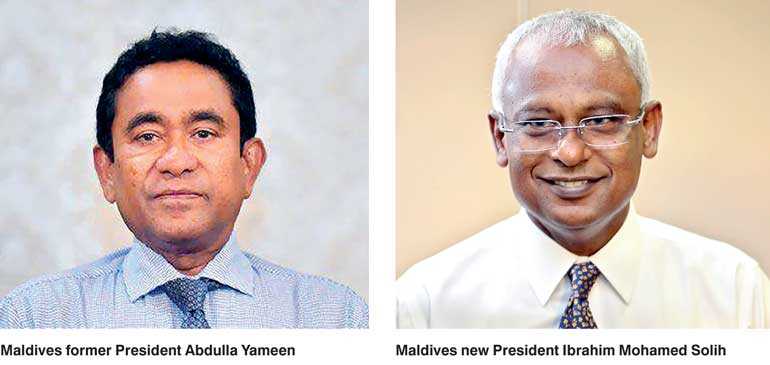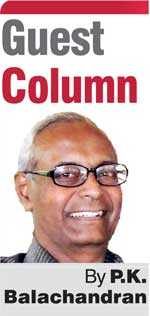Thursday Jan 15, 2026
Thursday Jan 15, 2026
Saturday, 6 October 2018 00:10 - - {{hitsCtrl.values.hits}}

When the result of the Maldivian Presidential election of 23 September came out, and the defeated incumbent, Abdulla Yameen, gracefully announced that he had accepted the people’s verdict and was bowing out of office on 17 November as scheduled, it was assumed that the transition to the Presidency of Ibrahim Mohamed Solih will be smooth.
Indeed, going by the dignified responses to the result from all sides, it did seem that the transition would be non-controversial. And the Government was cooperating with the transition process. The security forces had pledged to uphold the people’s decision. A Director General of Transition was in place and the Finance Minister had offered to devise next year’s budget in line with the opposition manifesto.
However, trouble had been brewing under the calm surface. When reporters asked President Yameen’s Progressive Party of the Maldives (PPM) if it would challenge the election result in the Supreme Court, it was hinted that a challenge could not be ruled out.
Indeed, it did not take Yameen long to challenge the election result. But to everyone’s surprise, he blamed for his defeat, the Elections Commissioners and their chairperson Ahmed Shareef, who were considered close to him. Shareef had been Secretary General of the PPM.
During the election campaign, the Joint Opposition had lambasted Shareef for being in cahoots with Yameen to rig the election by framing new rules to curb the right of party representatives to monitor the polling and counting, and to raise objections.
PPM’s allegations
The PPM issued a statement demanding a ‘transparent investigation and detailed public response’ from Shareef about the series of allegations of rigging. The PPM alleged there was a series of phone conversations between Shareef and an unidentified person about plans to rig the elections in ingenious ways.
According to ‘Maldivian Independent’ in the audio, Shareef could be heard telling the other man not to worry and to deny any allegations, assuring that he would not face a police probe.
According to the PPM statement, the 23 September election was the ‘most disorganised’ in recent history and there was “widespread anger over issues related to re-registration, lack of officials, massive queues at ballot stations and thousands of elections complaints involving serious violations of electoral regulations.”
The allegations included: “Hurried manipulation of vote counting equipment, unexplained removal of key members of the Elections Commission (EC) staff and failure to gather paperwork from polling station officials, remote access of the EC mainframe in the days leading up to and in the immediate aftermath of polling day.”
The PPM went on to demand that Shareef answer allegations which included rumours of a pen hidden inside a ring as well as a bank transaction record of a deposit into his personal accounts that run into millions of Rufiyaa. The pen and the ring were to enable the EC staff to invalidate ballots cast in favour of Yameen.
As if this was not enough, Dr. Abdulla Khaleel, a PPM MP, tweeted: “Vote Thieves who infringed on the people’s rights in collusion with the spy agency of a neighbouring country will be exposed [God willing]!” He did not name the country.
It is learnt that the PPM plans to appeal to the election complaints panel against the result. This has to be done before 12 October. If the complaints panel were to find the charges to be valid, it could recommend a fresh election. And a reconstituted Election Commission could call for a fresh election.
EC denies charges
But the EC dismissed the ‘unsubstantiated allegations’. The commissioners also charged that PPM goons were threatening the commissioners and harassing their families. Two of the five Election Commissioners had to be flee the country apprehending harassment and arrest, it is learnt.
The alleged harassment had caused international concern and the UN Representative for the Maldives had met the commissioners. Earlier, the international election observers had certified the 23 September election as a free and fair one.
Shareef, chairman of the EC, said that the audio of the alleged conversation about plans to rig the poll was doctored from multiple phone conversations. “It was edited, dubbed, and reordered to bring out a certain meaning,” he said.
There were no official complaints that could affect the outcome, the EC stressed. There were only 423 complaints in all. On the charge of invalidating votes for Yameen, the EC said that there had been only 3,132 invalid votes out of the 232,853 cast, which could not have bridged the yawning gap between Solih and Yameen. Solih had got 134,128 votes and Yameen 95,632.
And the whole process of voting and counting had taken place “in the presence of a record number of representatives of candidates, local and international observers and monitors,” the EC said.
Shareef also denied that he has an account in the foreign bank into which money had allegedly been deposited by an interested party.
Opposition had targeted Shareef
Ironically, before polling day, the Joint Opposition had made a number of allegations against the EC and its chairman, Shareef. It had said that Shareef and his team were planning to put in place ingenious systems to rig the poll in favour of Yameen.
Shareef, the opposition pointed out, was a close ally of Yameen and had been a Secretary General of Yameen’s PPM.
Meanwhile, the Maldives Anti-Corruption Commission (ACC) is investigating charges of money laundering against Yameen. The ACC had requested necessary documents from the Financial Intelligence Unit (FIU), a wing of Maldives Monetary Authority (MMA) responsible for investigating financial offenses. The case had been filed by the opposition Maldivian Democratic Party (MDP).
But the President’s spokesperson said that these were contributions by party supporters for his election campaign. The government had also refuted a report by Al Jazeera accusing Yameen of receiving $ 1.5 million in hard currency days ahead of the Presidential election.
According to Al Jazeera, the transactions were in breach of Maldives’ election law, which obligates candidates to set up separate accounts for campaign activities and also declare the identities of donors.
According to Maldivian Independent, the Government tweeted that President Yameen had set up a separate account for his Presidential campaign and all donations and funds had been duly deposited and disbursed through the account.
 Political developments
Political developments
Meanwhile, on the political front, the Supreme Court nullified the Election Commission’s decision to re-instate 12 MPs who had been unseated under the anti-defection law in 2017.
The court said that the cases regarding the MPs were still on and that the EC had intruded in its constitutional domain.
The MPs, who all belonged to the PPM, had defied Yameen and wanted to vote with the opposition on a motion of No-Confidence against the parliament Speaker. The MPs were unseated under the anti-defection law. But they went to the Supreme Court with an appeal against it.
President-elect Ibrahim Solih and others in the opposition have now said that the anti-defection and anti-defamation laws will be repealed.
After a court gave him bail, the leader of the Jumhoory Party (JP), Gasim Ibrahim, who was in Germany as a fugitive from the law, has come back to the Maldives. But the main architect of the opposition strategy, former President Mohamed Nasheed, who is also a fugitive from the law, is still overseas as the case against him, that of terrorism, is serious. He has to get court clearance to come back.
Turmoil in store
The Maldives is expected to go through a lot of political turmoil in the coming months due to a number of reasons: Firstly, Yameen could go the full length to remain in power. Secondly, the many cases he had filed against the opposition leaders would have to be completed. Thirdly, the Solih government could itself file cases against Yameen and his cohorts.
Fourthly, the Maldivian opposition is a motely crowd of parties with different ideologies, and led by ambitious leaders. The 60 dollar question now is: Will these leaders remain united? And if so, for how long? Parliamentary elections are due in March 2019 and that could be a divisive factor.
Moreover, the Joint Opposition manifesto says that the Solih Presidency will exist only for 18 months. After that, there will be a fresh Presidential election in which those leaders who were barred from contesting in September 2018 will be allowed to contest.
Among the possible contestants are former President and opposition stalwart Mohamed Nasheed and the Jumhoory Party leader Gasim Ibrahim.
A split opposition could well bring Yameen back as President because even with a united opposition, he had got 41.6% of the votes in the just concluded Presidential election. It was a reward for his developmental work and for giving a firm and stable administration (albeit an undemocratic one) to make economic development possible.